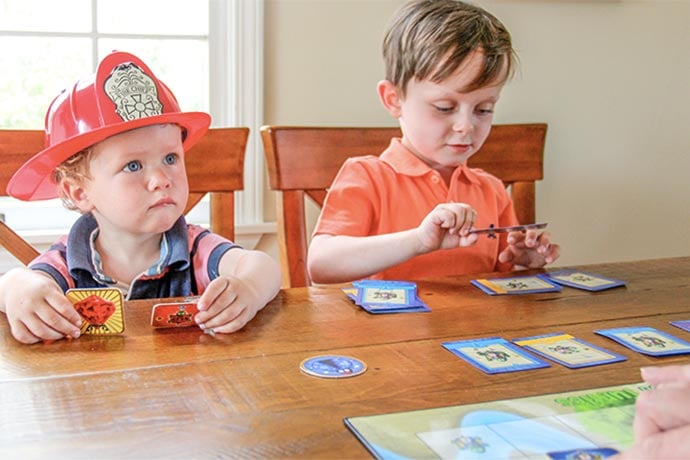Here are fun board games and card games for little kids, bigger kids, and families. Playing these games as a family with younger kids also can help them more quickly understand the games, more than if they were to play by themselves.
And don’t forget, in addition to board games and card games created to teach programming and computer science, look up chess, Go, Backgammon, and other traditional games which are fun to play and teach problem solving and strategy skills.
Robot Turtles
If your kids are under 8-10 years old, and especially if they have younger siblings, you might want to start with board games and toys that teach programming concepts. For example, Robot Turtles is a great board game with some neat extensions like an online community where you can create your own game boards. These games sometimes let you replace the object you direct in the game with a person like your child, or a parent, adding another level of fun and engagement.
Code Monkey Island
This board game is full of programming, mysteries, and fun for kids ages 8 and older. If played as a family, it’s likely younger kids will understand the game and have fun, too. The game uses cards to move a monkey around the island as kids learn strategic thinking, conditional logic, and how to adapt.
Bits and Bytes
Bits & Bytes is a fun card game to teach kids computing skills: logic, problem solving, and critical thinking. The game is absorbing and flexible. And, like the Robot Turtles board game, you can learn the basics of programming and computer science without needing a computer.
littlecodr
This deceptively simple card game for kids 4-8 lets them lay out a series of steps for their siblings and parents to follow. When they master the basic game, you can add more advanced cards.
codingFarmer
Created by teenagers, this Kickstarter project might be available in time for the 2015 holidays or soon afterwards. The game can be played with or without Java. Kids ages 7 or older figure out the game first then graduate to the Java cards. The creators also have a non-profit which teaches kids coding through their local libraries and the game reflects their experiences of what kids understand.
Notable Women in Computing Card Deck
A traditional card deck with the photo, name, and short biography of women who have contributed to technology instead of the usual royalty and pips for the number cards. They can be used to play Fish and other classic card games. The makers also offer a card with women from the Middle East and Africa, as well as posters for both cards. It’s also possible to download the poster and cards to print locally if you can’t pay $10 USD for cards or $25 USD for the posters.
Giggle Chips
A set of highly creative game cards created by a mom and her young doodling daughter that teach computer science concepts in a fun visual way.
Learn More
Robot Turtles Board Game
http://www.robotturtles.com/
http://www.thinkfun.com/robotturtles/adventure/
http://www.thinkfun.com/robotturtles
https://www.kickstarter.com/projects/danshapiro/robot-turtles-the-board-game-for-little-programmer
http://duxter.com/robotturtles
Code Master
http://www.thinkfun.com/codemaster
Code Monkey Island
http://codemonkeyplanet.com/
https://vimeo.com/93134600
Bits & Bytes
http://www.bitsandbytes.cards/
littlecodr
http://www.littlecodr.com/
https://vimeo.com/129334615
codingFarmer
https://www.kickstarter.com/projects/1233191773/codingfarmers
http://www.mathandcoding.org/
https://d2pq0u4uni88oo.cloudfront.net/projects/1967194/video-560468-h264_high.mp4
Notable Women in Technology Card Deck
http://www.notabletechnicalwomen.org/
http://www.notabletechnicalwomen.org/print-your-own-deck-or-poster/

